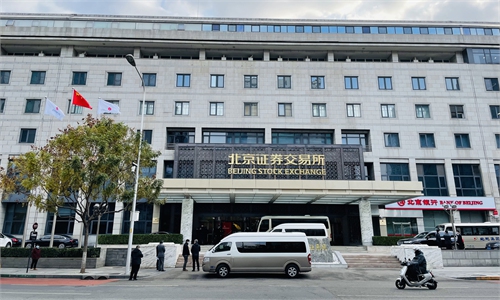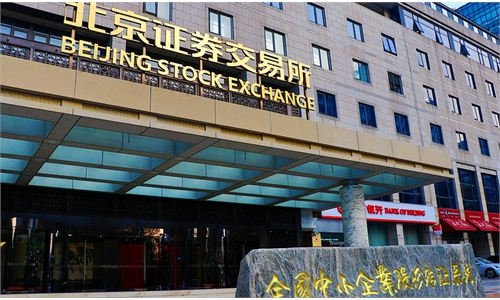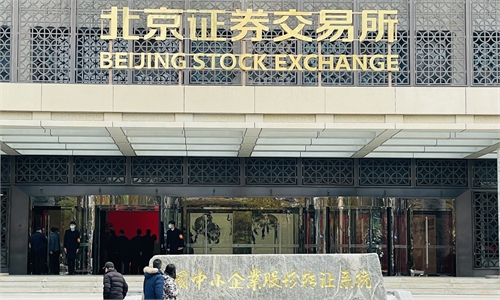On first anniversary, Beijing bourse widens goals in challenging era as Chinese equity market opens further
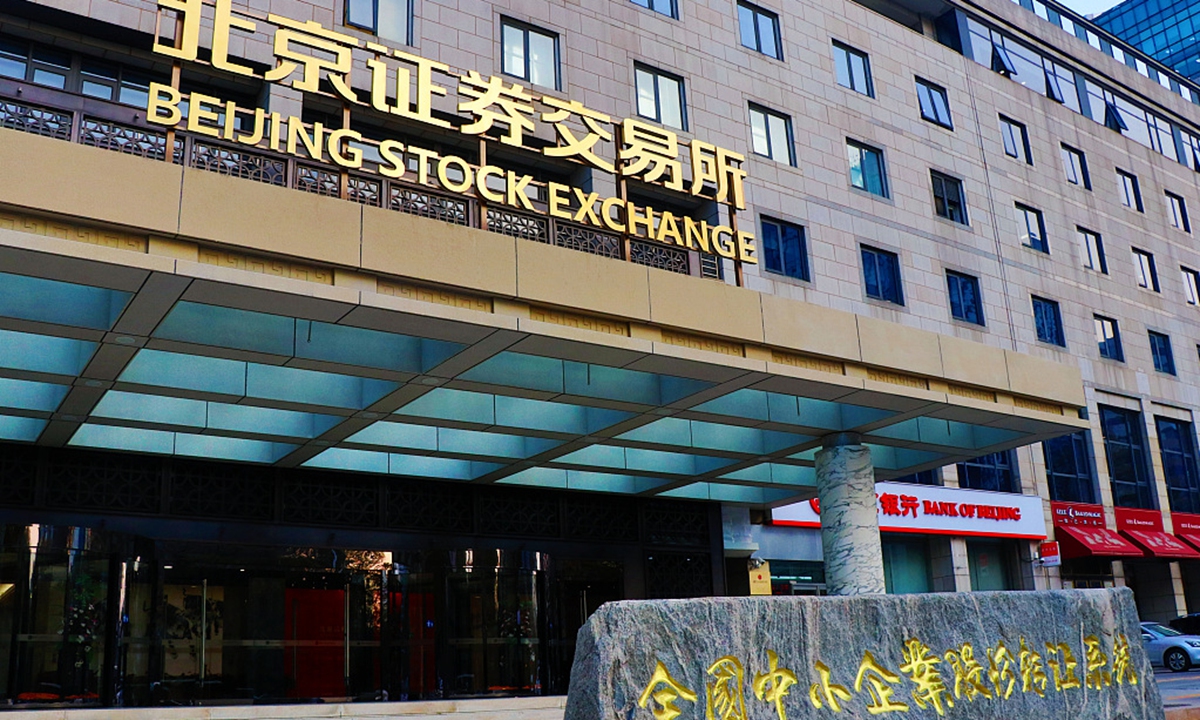
Beijing Stock Exchange. Photo: CFP
As the Beijing Stock Exchange (BSE) turned one year old on Saturday, the third-born of the A-share market showed that it aims to enrich trading portfolios and explore linkups with overseas capital markets, according to an official at the ongoing annual services trade fair in Beijing, where the BSE was born.
Two momentous measures were unveiled on Friday — a plan for a BSE Index and draft rules on margin financing.
With BSE listings totaling 110 and a combined market capitalization of around 200 billion yuan ($28.95 billion), the Beijing bourse, designed as a major platform for innovative small and medium-sized enterprises (SMEs), has achieved the desired results over the past year, market watchers and listed companies said.
Now, they're hoping for lower thresholds for qualified investors and inflows of more longer-term capital as the BSE continues to race ahead.
The anniversary coincided with the Chinese securities regulator's announcement of new initiatives to support Hong Kong's capital markets, as the country's equity market, which has withstood challenges amid multiple domestic and overseas complexities, is unwavering in its opening push.
Stable beginning
Speaking at the China International Finance Annual Forum 2022 at the sidelines of the annual China International Fair for Trade in Services (CIFTIS) on Friday, Jin Wei, vice mayor of Beijing, vowed to push for the BSE's continued improvement in trading mechanisms, the bourse's expansion in trading scale, enrichment in trading portfolios and exploration of tie-ups with overseas capital markets. The goal is to turn the young exchange into a major platform for innovative SMEs.
Later in the day, the BSE took the wraps off its new securities index management rules. The first index to track the market is named the Beijing Stock Exchange 50 Index, abbreviated as the BSE 50.
The index has included 50 stocks considered to be representative of the Beijing market, as measured by capitalization and liquidity. The base value of the BSE 50 has been set as 1,000 on April 29, which was roughly half a year after the bourse opened for trade on November 15.
The bourse has plans to compile different indices, as measured by scale, industry, theme and style, to flesh out the market's index system and create a barometer of innovative SME development, the exchange said in a statement it sent to the Global Times on Friday.
The BSE also said on Friday that it was soliciting public comments on draft margin financing trading rules through September 17.
Describing margin financing as an important basic system in the securities market and a mature approach to trading in the international equity market, the BSE revealed in the statement a prudent selection of stocks that would be eligible for margin loans as part of risk control measures.
The Beijing bourse was registered as a company with capital of 1 billion yuan on September 3, 2021, just one day after the Chinese leadership announced the creation of the exchange at the 2021 edition of the annual services trade fair. The BSE became the "third child" of China's A-share market, in addition to the Shenzhen and Shanghai bourses, both of which are now in their early 30s.
The BSE got off to a sound start, making steady headway in infrastructure construction and market ecosystem, largely in line with expectations, Zhou Yunnan, founder of Beijing-based Nanshan Capital, told the Global Times on Friday.
As of Friday, 110 companies had floated on the BSE with combined capitalization of nearly 200 billion yuan. The listings encapsulate premium firms in industrial materials, information technology, healthcare, the low-carbon economy, consumption and other diversified and innovative spheres, according to the stock exchange.
The 110 firms have an average total market value of 1.78 billion yuan apiece, with earnings growth of 8.15 percent, per data from East Money Information, a Chinese financial and stock information provider.
The BSE listings' average capitalization was smaller than roughly 95 percent of their siblings in Shanghai and Shenzhen, the Friday data showed.
The number of BSE listings is likely to exceed 150 within the year, according to Zhou, a senior market commentator.
In another sign of vibrancy, the number of qualified investment accounts has topped 5.1 million and 11 BSE-themed funds have been approved in two batches, Zhou noted, saying that the bourse will expand the ranks of its investors and encourage institutional investor engagement.
Liu Zimu, an often-cited source of insight into the BSE, said that one of the stock exchange's stellar achievements over the past year was the entry of professional institutions, led by mutual funds, which pushed the bourse to be more institutionally oriented.
"The BSE announcement came amid the COVID-19 pandemic, with all market participators combating the epidemic while building the bourse and exploring innovations," Liu told the Global Times on Friday.
Having a BSE listing has apparently put companies on a fast track to financing, although market liquidity is still insufficient.
The bourse listing helps greatly with fundraising, Wang Yun, board secretary of BSE-listed Welltrans O&E Co, a video surveillance supplier located in Wuhan Optic Valley, told the Global Times on Friday.
Wang said lower thresholds for investors and the availability of more long-term funds in the market would help address the lack of market liquidity.
Individual investors qualified for trades on the BSE must have a minimum of 500,000 yuan of assets in their equity accounts, a threshold on par with the STAR Market in Shanghai.
The threshold for investors eligible for trading in the ChiNext market in Shenzhen is set at 100,000 yuan.
Xiang Youliang, chairman of Honsun (Nantong) Co, a BSE-traded healthcare equipment maker in East China's Jiangsu Province, told the Global Times on Friday that pro-liquidity measures are expected.
Still, the Beijing market listing augurs well for the company to boost its exposure and increase its industry clout.
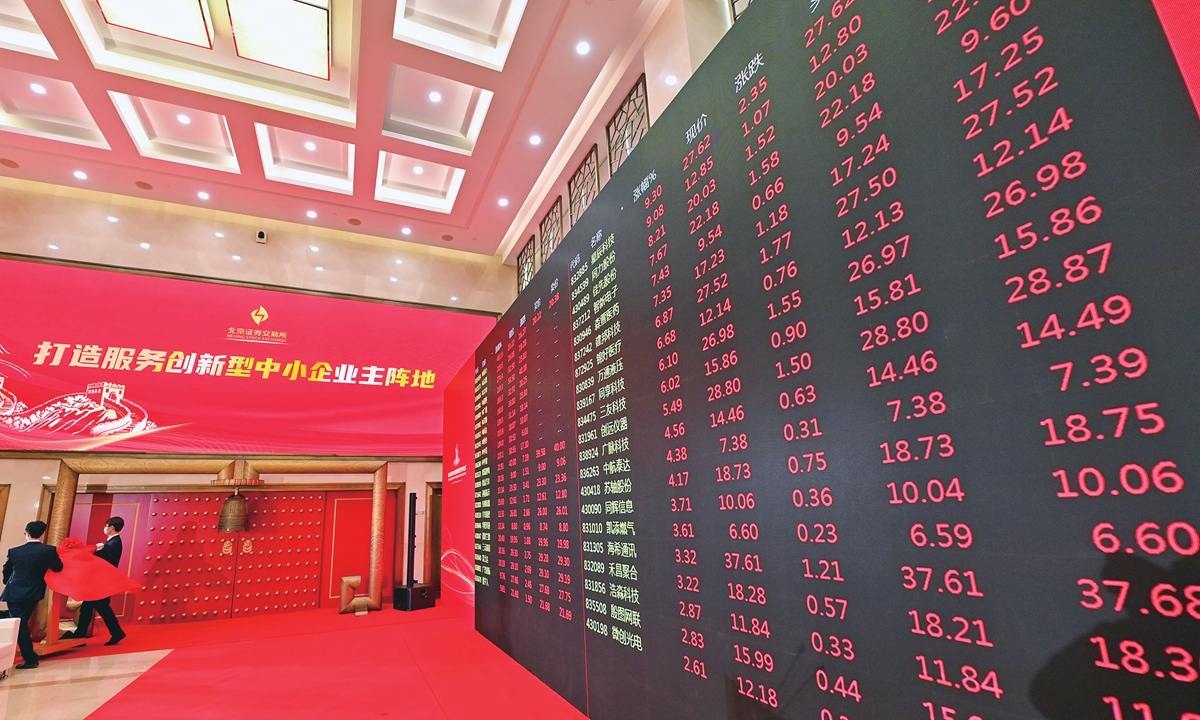
The newly-established Beijing Stock Exchange (BSE) starts trading on November 15, 2021 in Beijing, with the first batch of 81 companies debuting on the bourse and a turnover hitting 9.58 billion yuan ($1.5 billion). The firms listed include 10 that were newly approved and 71 that were transferred from the selected tier of China's National Equities Exchange and Quotations. Photo: Xinhua
BSE aims bigger as market opens wider
The BSE market should improve refinancing policies, lower the threshold for qualified investors and further clarify listing requirements and sectors that are off-limits to IPOs, Liu suggested.
The BSE has become the lowest-cost market globally for listings, and overseas investors have become involved, he said.
There's no information so far as to how overseas companies could get listed on the BSE, and the exchange's internationalization remains much of a long-term vision, the observer said.
Institutions participating in the Qualified Foreign Institutional Investor program and the Renminbi Qualified Foreign Institutional Investor program, two of the major regimes enabling foreign access to the domestic capital markets, are involved in the BSE, so the bourse is set to quicken its globalization, said Zhou.
Other than plans for overseas linkups, as disclosed by the vice mayor of Beijing, the Ministry of Finance issued Treasury bonds of 60.3 billion yuan on the BSE on Friday, the bourse's first Treasury sales.
The Beijing market's impressive progress and promising prospects are considered a vibrant contributor to the country's robust stock market.
At the same CIFTIS forum on Friday, Fang Xinghai, vice chairman of the China Securities Regulatory Commission (CSRC), said that the capital markets have withstood severe challenges with brisk trading, playing a significant part in stabilizing the fundamentals of the macroeconomy and societal expectations.
In yet another opening move, Fang announced three new initiatives aimed at broadening capital market cooperation between the Chinese mainland and Hong Kong.
The new measures include the inclusion of Hong Kong-traded foreign firms in the southbound leg of the stock linkups between mainland and Hong Kong bourses and the expanded inclusion eligibility for the northbound leg.
The support for yuan-denominated counters in the southbound stock connect, and the launch of Treasury bond futures in Hong Kong, were also among the new initiatives.
"These measures will continue to support Hong Kong's development as an international asset management center, risk management center, as well as an international offshore yuan trading hub," Nicolas Aguzin, CEO of Hong Kong Exchanges and Clearing (HKEX), the operator of Hong Kong's stock exchange, said in a statement on Friday.
"Connecting China and the world is at the core of HKEX's strategy and we look forward to working with our stakeholders and partners in the mainland as we reinforce our role as a global super-connector," Aguzin remarked.

